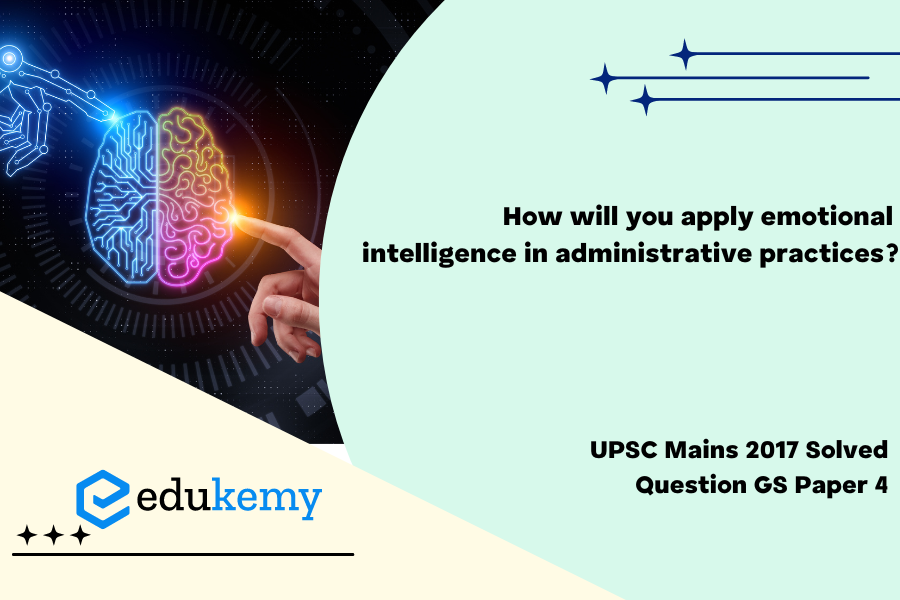In the realm of administrative practices, the application of emotional intelligence emerges as a crucial facet, contributing significantly to effective leadership and organizational success. Emotional intelligence involves the ability to recognize, understand, and manage one’s own emotions while also being attuned to the emotions of others. In an administrative context, this skill set becomes paramount in fostering positive workplace relationships, enhancing communication, and mitigating conflicts. As an administrator, I will apply emotional intelligence by cultivating self-awareness to better understand my own emotions and reactions, allowing me to respond thoughtfully to challenges. Moreover, I will strive to empathize with the diverse emotions of team members, creating an inclusive and supportive environment. Utilizing emotional intelligence will enable me to navigate complex interpersonal dynamics, make informed decisions, and ultimately contribute to a harmonious and productive administrative atmosphere.
Tag: Emotional intelligence-concepts, and their utilities and application in administration and governance.
Contents
Decoding the Question:
- In Introduction, try to define emotional intelligence.
- In Body,
- Discuss the ways by which one can apply emotional intelligence in administrative practices.
- Discuss how emotional intelligence can be learned?
- In Conclusion, try to conclude by mentioning the significance of emotional intelligence. Do mention a quote (if possible).
Answer:
Emotional intelligence refers to an individual’s capacity to comprehend and control his or her own and others’ emotions. It is a critical characteristic for professional success. This is because people are hired on the basis of a similar intelligence quotient, which is tested by exam or interview; what separates one person from another is their emotional quotient.
When emotions run high, they change the way our brains function, diminishing our cognitive abilities, decision-making powers, and even interpersonal skills. Understanding and managing our emotions and the emotions of others helps us to be more successful in both our personal and professional lives.

The ways by which one can apply emotional intelligence in administrative practices are:
- Being self-aware as an administrator helps us in having a clear picture of our strengths and weaknesses. If people are self-aware, they always know their feelings and how emotions affect the people around them.
- Administrators must self-regulate themselves effectively. A self regulated administrator would not verbally attack others, make rushed or emotional decisions and/or stereotype people or compromise values
- Administrators should constantly motivate themselves and their team members thus consistently working towards their goals. This also helps in maintaining an extremely high standard for the quality of their work.
- Applying empathy in administrative practices is critical to managing a successful team or organization. Administrators with empathy have the ability to put themselves in someone else’s situation.
- By developing social skills administrators would also become great communicators thereby getting their team support and will also be good at managing change and resolving conflicts diplomatically.
We have all experienced or have met people that seem to be naturally gifted at controlling or recognizing their emotions. These individuals seem to understand how to put others in a comfortable place, or get them engaged, or even to give another person whatever it is that they need at that time. Therefore, emotional intelligence can be learned through:
- Workshops and Certification programs for the developmental and behavioural assessment training.
- Communication skills and the power to comprehend nonverbal cues of interaction (body language, facial expression, the tone of words, etc.).
- Group performance, especially at the workplace and maintaining a high team spirit.
- Practicing empathy by centering on verbal and non-verbal cues gives invaluable insight into the feelings of colleagues or clients, which will also help in developing emotional intelligence.
- Several self-assessment training can be done too: Choosing not to retort immediately, answering wisely in conflicts, personal introspection and taking feedback from peers, friends, practicing empathy as a daily habit, etc.
Emotional Intelligence training is given in most work environments, government professions throughout the globe. Therefore, training through several methods definitely help in the personal and professional growth of an individual, as any characteristic being practiced as a part of his/her general personality tends to be inculcated in the long run.
As David Goleman rightly said, Emotional intelligence is a person’s ability to manage his/her feelings so that those feelings are expressed appropriately and effectively. This clearly means that emotional intelligence Is the largest single predictor of success.
In case you still have your doubts, contact us on 9811333901.
For UPSC Prelims Resources, Click here
For Daily Updates and Study Material:
Join our Telegram Channel – Edukemy for IAS
- 1. Learn through Videos – here
- 2. Be Exam Ready by Practicing Daily MCQs – here
- 3. Daily Newsletter – Get all your Current Affairs Covered – here
- 4. Mains Answer Writing Practice – here


